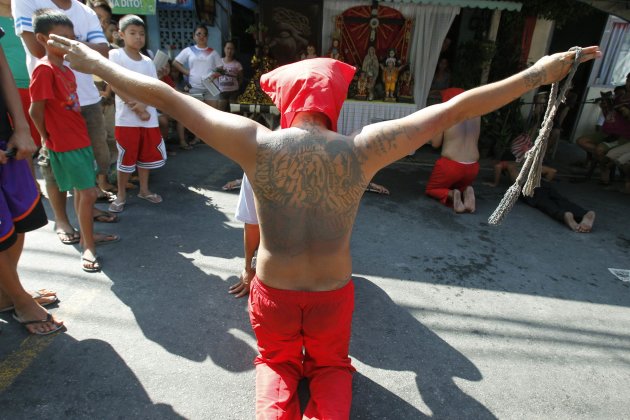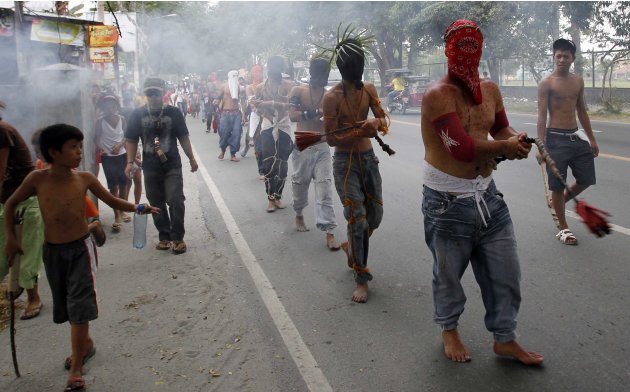Thursday, April 5, 2012
Potentially Problematic Penitential Popular Piety in the Philippines
Yes, I thought the title would be slightly more clever than "Look at these Filipinos!"
There is a tradition of popular piety in the Philippines that, at times, seems extreme to the outside world. Being raised in American culture, despite being Filipino, I can speak to the surprising and oft disturbing aspects of piety in the Philippines. Perhaps the most recognized example of this is the tradition that takes place in Pampanga every Semana Santa (Holy Week). Penitents, mainly male, hooded in red cloth, flagellate themselves while processing barefoot outside for miles on end. Some do this as a sign of devotion, in the hopes that their prayers will be answered or their wishes granted (the second being less theologically correct). Many, however, do it as a sign of penance for their sins and/or for the sins of their loved ones. Now, to be clear, when I say "flagellate", I don't mean mock or pretend whipping. I mean, true whipping, causing their backs to burn and bleed. Its this that scares and frightens much of the Western world, and even other Filipinos.
Critics will ask "Why is this necessary? Christ suffered and died on the cross for us, for our sins. He bore the necessity of suffering, so that we might not have to". Others will say that this is just the Philippines, where things are done in a backwards way, that it is just not civilized enough to realize their error. Even the Catholic Bishops of the Philippines have long discouraged this and similar practices as inappropriate.
Now before I answer, let me be crystal clear: I do not condone this method of penance, but I appreciate the reason (though some of the reasons need to be addressed with better catechism). To the critics, I say that Christ died so that our sins may be forgiven. That forgiveness brought us into reconciliation with God, without which would have led to eternal separation from God. But it has long been a teaching of the Church that sin has a twofold punishment: an eternal and a temporal. Reconciliation addresses and forgives the eternal punishment. However, there is still a temporal penance that must be accounted for. Good example: a child disobeys his parents. Later, the child ask for forgiveness, which his parents lovingly and immediately give. But the parents still ground the child. In American society, this is definitely not a foreign concept and it lends to a good understanding of penance. Now while I can keep going on the topics of sin and penance, this post would be much longer than I wanted...and I'm already bordering on the long-winded. Suffice it to say, penance is a necessity. To the other critics of the Philippines, yes, my country is still developing. It still holds to many traditions that seem out of place in the modern world. But that does not mean it is ignorant or backwards. It simply recognizes the beauty and importance of doing things the Filipino way. I would argue that when it comes to civility, the Philippines is far more civil than much of the Western world. And lastly, the Church does not approve of these practices, and trying to be the good Catholic, I agree with the Bishops. There are many methods of penance, but this does not seem to be the best one. However, as all Catholics know, popular piety cannot be easily disregarded. The rosary started off as local popular piety too. Now, I am in no way suggesting that self-flagellation will one day become as mainstream Catholic as the holy rosary, but I am saying that popular piety, when given the proper catechism, is a foundation of the Church. The Catholic Church is an amalgamation of lay faithful that come from all parts of the world. And with them, the laity bring cultural beauty to the faith.
So there it is folks. Being Filipino, I do not agree with the methods. But I do appreciate and respect the piety behind it. While the Church offers us many avenues, we each still seek our own path to heaven. Who am I to deny the truly sorrowful penitent his or her penance? What God desires more than the bones of a saint or the blood of a martyr is the penitent tear of a sinner. As we enter these holy days, let us all remember that.
Dominus vobiscum.
Photos: Reuters
Subscribe to:
Post Comments (Atom)



No comments:
Post a Comment